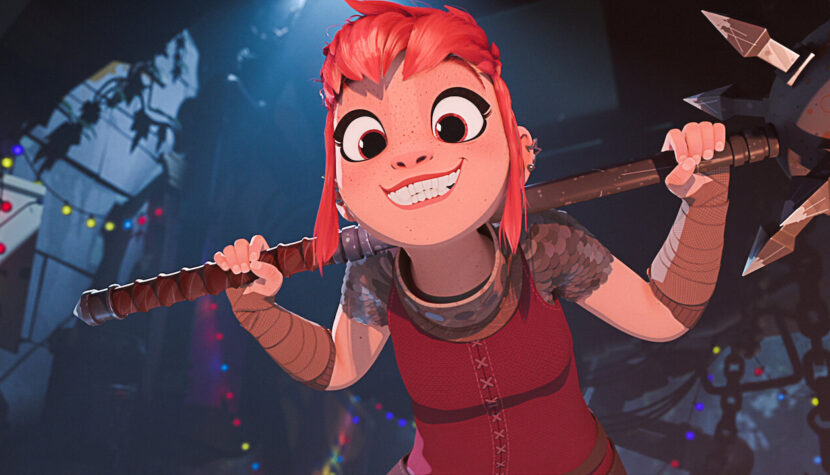NIMONA. I’m Afraid of What I Don’t Understand [REVIEW]

It must be admitted that when it comes to full-length animations, Netflix rarely makes a mistake, both in terms of productions created from scratch in their studio (Netflix Animation) and full-length animated narratives for which they acquire distribution rights. A title from this group is Nimona which debuted on Netflix at the end of June 2023 after years of production difficulties. And luckily, they managed to share this beautiful story with the whole world.
The directing duo behind Nimona, Nick Bruno and Troy Quane, already have a full-length animation to their credit, the very funny and underrated spy comedy Spies in Disguise from 2019. Compared to their latest work, that animation is just a trifle – Nimona is a full-blooded tale of rejection, loneliness, and a sense of not fitting in, which accompanies both main characters in the futuristic-medieval kingdom. These characters are the noble knight from the common folk, Ballister Boldheart (voiced by Riz Ahmed), and the titular Nimona (Chloë Grace Moretz), a teenage individual with truly exceptional abilities. This pair meets in dire circumstances: Ballister has just been accused of treason and murdering the queen, and the impulsive Nimona tries to assist the disgraced knight in… Well, what exactly? Boldheart wants to clear his name and believes he’ll be treated fairly, while the marginalized magical being desires only to sow chaos. The fate of both of them depends on whether they can reconcile and work out a compromise strategy.

Nimona is a thoroughly adventurous story, but from nearly the first moments, it’s marked by a haunting darkness and sadness. Ballister, despite being one of the finest knights in the realm, comes from common stock and stirs mixed feelings in a society where a knight from outside noble lineage is an outsider. The noble warrior is framed for murder, which is an exceptionally dark plot element, especially by animation standards. Additionally, Ballister is in a romantic relationship with fellow knight-pupil Ambrosius Goldenloin, but due to their profession, they must hide their feelings from the world. Nimona is an even more tragic character – capable of transforming into any creature, she’s remained on the outskirts of society for centuries, sinking into solitude and a sense of rejection. The world sees her as a monster, following the maxim “I fear what I don’t understand,” condemning Nimona to a life of isolation. When this character learns about what happened to Ballister, she finds a spiritual ally in him, not only in sowing potential chaos (which Nimona loves to do) but also in the sense of societal rejection.
ND Stevenson, the individual behind the comic original of Nimona identifies as non-binary and poured many of their own experiences into the titular character of the Netflix film. When the main characters talk about how and why Nimona shape-shifts, we learn that it’s due to a “itchy feeling inside.” Shape-shifting becomes a way of dealing with identity crisis, a need to escape gender and societal constraints. “What would happen if you didn’t change?” Ballister asks, to which Nimona replies, “I’d die. Maybe not literally, but it wouldn’t be living.” In this exceptionally well-written, candid dialogue, the suffering of thousands, if not millions, of young people seeking answers to the question “who am I?” is encapsulated, those trying forcefully to fit into societal molds imposed on them. Nimona will be a kindred spirit for them, a symbol of liberation that they might not yet be ready for, but one that – according to the message of Nick Bruno and Troy Quane’s film – is definitely worth fighting for.

Nimona is a wonderful animation, captivating not only in its visual layer – the combination of medieval and futuristic elements, along with the absence of vivid saturated colors, might surprise you! – but also in the remarkable depth of the story being told. I’m not sure how the story of a gay knight and a non-binary shape-shifting character will be received in Poland, where the native dubbed version still likely irks with forms like “zrobiłom” instead of “zrobiłem/zrobiłam,” but I already know that it has been loved by critics and viewers worldwide – evident from the over 90% ratings from both groups on Rotten Tomatoes. Such consensus between film journalists and the audience is truly rare, and it seems that this is the best proof that “Nimona” is an absolutely unique work.

